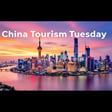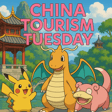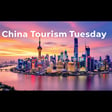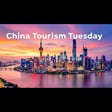Become a Creator today!Start creating today - Share your story with the world!
Start for free
00:00:00
00:00:01

China Tourism Tuesdays Episode 5
Featuring Guido Brettschneider, CEO of TUI China, we discuss inbound tourism trends to China, emerging destinations, products and experiences, as local governments across China invest more into attracting inbound travellers to the Middle Kingdom.
Recommended
Transcript
Introduction to Hosts and Guest
00:00:08
Speaker
destinations to China. My name is Shaul Batain and I'm coming to you from Shanghai, China. ah Good every day everybody. Today and my name is Michael Jones and I'm speaking from Beijing.
00:00:20
Speaker
ah Today we have a wonderful guest, ah old friend Guido, who works with TUI China and um in his office here in the TUI office of China in Beijing.
Guido's Background and Role at TUI China
00:00:34
Speaker
and ah yeah i'd like to welcome guido and uh guido if you can please just uh give a short introduction of yourself and tell us what you and tui are doing here in china yes first of all thanks a lot for having me here my name is guido bradschneider i'm a german basically based in china for more than 20 years now as general manager of tui china we are part of tui group ah basically responsible for operating inbound business from or all European source markets into China.
00:01:09
Speaker
We also do cooperation partners, outbound business from China and we do local activities with big multinational companies.
TUI China's Focus on European Inbound Tourism
00:01:17
Speaker
and Office here in Beijing, we have a small office in Shanghai and basically we are focusing on European leisure business coming to China.
00:01:26
Speaker
Okay, cool. And tell me, so with, ah tell us a little bit about inbound China from a TV perspective. I mean, it's um we basically serving mostly European, German customers, Scandinavians, Dutch, let's say all central European, northern European markets. We don't have too much American or Australian business. So we're really focusing on European customers coming to China.
00:01:57
Speaker
I would say majority of our tourists coming to China are coming group trips. So that's organized. travel covering let's say the core destinations in China so let's say a standard China trip for European tourists would include a couple of days in Beijing so see the Forbidden City, the Great Wall, the Temple of Heaven, all the sites in Beijing then go to Xi'an There see the terracotta army especially, the city walling, Xi'an.
00:02:29
Speaker
And then from there often our customers go to the Yangtze River. So basically going to Chongqing and stay then three nights on a nice ship ah from Chongqing down to Ichang, three gorges, big dam project in Ichang.
00:02:44
Speaker
And then often customers go to Shanghai. basically see at the end the big metropolis there so i think it's a good way to see china historical part especially beijing xian then in shanghai sees a modern developing ah china and then on the young to see a beautiful nature and also have a bit of time to relax on the ship so that is a bit let's say a standard tour ah for most of our customers coming to China.
00:03:11
Speaker
A bit more additional would be trips including the South, so Gullian, Yangshou, Hong Kong, is especially interesting for English customers.
Tourist Demographics and Language Barriers
00:03:22
Speaker
For customers that are having more time or that come back to China, We also have lots of trips including Tibet. um So basically takes a train to Lhasa, going around in Lhasa and then maybe seeing Shigat and Yat. So it's a bit of an overview about our core product when it comes to China.
00:03:46
Speaker
And I would like to just ask you quickly, um what is the profile of, i mean, you mentioned the nationalities and everything, but ah male, female age groups, I mean, we see more demand also from families and let's say younger people, but let's say often on average, our customers is a bit older.
00:04:06
Speaker
So would say 50, 55 plus. We also have some and really senior customers. I think we just had to last week got a booking for a German customer, 95 years old. So, mean,
00:04:22
Speaker
i mean China with all the history, with the culture, I think it's ah still ah destination that for a lot of people it's on the bucket list. So you want to see China, you want to see the terracotta army, you want to walk the Great Wall at least once in your life.
00:04:37
Speaker
And We have a growing demand from FIT, some individual customers coming to China, but giving the language, giving the big distances, giving the difficulties to organize a China trip by yourself.
00:04:50
Speaker
So the majority of customers still coming with a group trip and often group trips also is with a tour guide, lots of ah recommendations and lots of comments from the guide. So it's a bit more attractive to, let's say, ah people 50 above.
00:05:06
Speaker
Okay, cool. I mean, ah a week ago, Charles and I were talking a little bit about my experience when I went to Futur Madrid. Okay. And ah so there you got all these national pavilions. And ah obviously, China has now created visa-free for a whole lot of European nationals traveling to China, which, frankly speaking, 10 years ago was
Visa Policies and Marketing Strategies
00:05:30
Speaker
unimaginable. Mm-hmm. So that was quite a bold move by them.
00:05:35
Speaker
ah But then in terms of like promoting China, um what what I noticed, the Ni Hao China national stand was... fairly boring it was very standard it was very 1980s kind of looking no lcd screens no i mean compared to the middle eastern stands which just dazzle you and excite you so like charlotte and i were talking about like the the way the three of us understand china having an incredibly rich history depths of culture, amazing homegrown technology, but none of that was really on show.
00:06:16
Speaker
So I don't know, how how do you feel about how how China can go about promoting itself better to the outside world? and I fully agree. I mean, first, you also feel the um improved visa rules are extremely helpful for the business to China. And I mean, 30 days visa free from the majority of European countries, it's good, it's great.
00:06:39
Speaker
and But it's also a bit of a pity, I guess, if you go around in the Netherlands or Germany or in Scandinavia and asking people, would it be easy to come to China? The majority would think, oh, probably i need a visa.
00:06:50
Speaker
So I think not so many people were actually aware and that coming to China it is not super easy. So we try our best to communicate wherever we can.
00:07:00
Speaker
But I would agree it would be important helpful if there would be a broader campaign saying come to China, it's super easy, no visa required if you stay 30 days. So and I felt what Hong Kong did after the end of COVID basically having lots of subsidized or free flight tickets that people actually can experience how easy it is to come to Hong Kong. That would be a good example also for China.
00:07:26
Speaker
So I think we're starting to working with several cities and destinations in China promoting the the destination. I feel it would be great if that would be even intensified. As you said, other destinations were probably more aggressive when it comes to promoting their destination. So I think there is something that could be done and improved.
00:07:48
Speaker
Because now coming to China is easy, it's perfectly safe, there's a lot of flight connections. As you said, the diversity of China, not only historical places, but also new ones.
00:07:59
Speaker
Trying a self-driving car in Shanghai, seeing the Alibaba campus in Hangzhou, seeing how c incredibly quickly the Senjen developed, seeing the amazing train connections in the country.
00:08:12
Speaker
And there are so many parts of China above and beyond the cultural and historical sites that are interesting for foreigners yeah yeah i'd like to just jump in here um and ask you you know i think as you as you did touch on a lot of provincial and city governments in china have been investing quite a lot into inbound awareness campaigns so for example you know inviting um travel agencies from Western countries and the rest of the world to actually come and visit less known um destinations in China.
00:08:49
Speaker
I was wondering if you could tell us a little bit about how, you know, the Chinese government's efforts to increase inbound tourism have maybe registered with you and whether you have maybe been moved to look at new regions for your products and your experiences?
Diversifying Tourist Destinations
00:09:07
Speaker
Yes, I mean, we have been working closely, for example, with Hangzhou in the last year, and we had 40 travel agents, decision makers coming to China, especially coming to Hangzhou. mean, Hangzhou, this example, is a very, very big domestic travel destination.
00:09:23
Speaker
But for the time being, it has not been that known for foreign travelers. But it's a beautiful city. It's also a different experience compared to, let's say, Shanghai. i mean, it has much more with the lakes, with the nature, the big temples around. So there's a lot of places to see, but it was not that known.
00:09:41
Speaker
And as you all know, travel is about experiences. So and first, we need to convince two operators, travel agents in Europe that the destination worth going and then they would add it in their programs and products.
00:09:55
Speaker
So therefore we feel that FEMTRIPS, that inspection trips for decision makers, it's the first step to really promote a destination in China. and um For the Hangzhou example, everyone who went to Hangzhou said, oh, actually it's a beautiful destination. It's very great to go.
00:10:11
Speaker
and For me, that is the key to unlock additional destinations in China. And there are so many places that have beautiful things to see nature-wise, culture-wise, but are that are not very well known.
00:10:24
Speaker
Another example we worked in the past took together with Dujang Yen. beautiful city north of Chengdu with a panda research center, with I think three or four UNESCO World Heritage sites that practically not many foreigners know about.
00:10:38
Speaker
But when people go there and say, oh, actually it's easy, it's beautiful to go, it's not far from Chengdu, so it's also easy to integrate and ah it in an itinerary.
00:10:49
Speaker
So that makes it very easy to basically create new products, including this destination.
Modern China's Appeal
00:10:55
Speaker
it's It's interesting that you mentioned um that, if i did if I understood you correctly, that a lot of your leisure products include quite a bit of, I would almost call it industrial tourism or infrastructure tourism. And um I think often ah from the you know the state tourism boards or the the municipal tourism boards,
00:11:15
Speaker
This is something that they don't always understand in China, from my experience, is that a big drawcard for inbound tourism is just literally looking at infrastructure, looking at an incredible factory or an incredible innovation area, or, you know, like you said, the Three Gorges Dam.
00:11:34
Speaker
and This is almost something that needs to sink in with a lot of the government tourism promotion agencies in China. Absolutely. I think the newer generation also or realizing it that ah China has much more to offer than the pure culture and history.
00:11:55
Speaker
And if you want to attract younger customers, they want to have also still want to see all the big historical site, but they also want to get a feeling about the new and developing China. And to me, Shenzhen, it's an amazing city to see it so new, so young. And then people realize how quickly it developed. We always like to bring our customers to the city development museums. I mean, if you come from Europe, and nothing is changing very quickly.
00:12:24
Speaker
And then if you see that Pudong, 20, 30, 40 years ago was practically fields and farming area or that Xenzhen was a small fishing village for the opening up and now it's a bustling city of I don't know how many people.
00:12:39
Speaker
ah Or when you go to Chongqing, people say the biggest city in the world and seeing how ah amazingly quickly the cities developed. I think for Europeans it's also an Yeah, just try to get an understanding of the quick development of China. You always read about it's the fastest growing economy, and but then really feeling what does it mean in the cities or when people see the train network, seeing how Amazingly on time the trains operating and comparing this to the experience they have made in Germany or in other parts of Europe.
00:13:14
Speaker
I think that's also an attractive thing. And when people come back from China, i mean, we see the customer surveys, the customer satisfaction of a China trip is extremely high.
00:13:24
Speaker
people maybe expect it to be more difficult or more tiring but when they come as they realize actually people are very friendly the food is amazing the hotels are new um the trains are on time ah the airports are very structured and and so therefore people that come to china are mostly always very very ah enthusiastic and satisfied with the trip So now, obviously since COVID, um things changed a lot
Impact of Geopolitical Tensions on Tourism
00:13:57
Speaker
there.
00:13:57
Speaker
um There's obviously a big increase in geopolitical tension. Do you think that, well, you can speak on behalf of Europeans possibly, do you think ah more Europeans are now possibly more scared of coming to China?
00:14:15
Speaker
I would not call it scared. I mean, it's always difficult to say what drives decision making for destination or for for holiday. We definitely feel that certain markets um have maybe more, don't know, political concerns, or maybe they're not really feel if it's the right thing to do to come to China.
00:14:37
Speaker
and For example, in the Scandinavian source markets, we feel more, would call not to be reluctance, but maybe at least question is the right thing to do right now and not other markets like Eastern Europe. They are see very, very strong growth when it comes to markets like Eastern Europe.
00:14:54
Speaker
Also Germany is doing quite well. and yeah I mean, I do believe that geopolitical situation is definitely affecting the decision making of some of our tourists.
China's Unique Attractions
00:15:08
Speaker
And I mean, if you were to give like a a very short one or two sentence, like elevate a pitch to foreigners why they should come to China, why they should strongly consider coming to China, what what would it be?
00:15:22
Speaker
i mean I do believe China probably is so one of the very few countries that has three, four bucket list attractions that are only here. I mean, there's only here the Forbidden City, there's only here the Great Wall, there's only here the Terracotta Army, there's only here the Shanghai.
00:15:38
Speaker
ah skyline I mean, there are so many sites that are really unique in the world from a historical, from a cultural ah importance. So if you want to understand Asia, then China is the middle and the core part.
00:15:53
Speaker
And also the food, I mean, um obviously there are also Chinese food all over the world, but I do believe that the cultural and the culinary experience in China is unique.
00:16:04
Speaker
So therefore, and it's one of the safest destinations in the world, so the combination of ah historical sites, economic development, cultural experiences, food, i think that makes China a unique destination.
Favorite Destinations in China
00:16:21
Speaker
So I wanted to ask you, what's your favorite? If you had to pick one place for a holiday leisure destination in China, what would it be? Well, I kind of want to say off the top of my head, Hong Kong, just because it's such a nice break from the mainland. You know, you kind of go there and there's, you know, there's like a sort of, it shows a bit like South Africa. There's rugby, there's a bit of that Anglo culture.
00:16:46
Speaker
zo But it's it's a bit Chinese as well, which is it's a nice break. But I mean, if I had to be, you know, seriously sit that sit down and think, it would probably still be in Guangdong province.
00:16:58
Speaker
I'm big fan of Chajo, the ah beef hot pot there, the amazing culinary traditions they have over there, ah the countryside of Guangdong and also Guangzhou because it's ah so many other fellow Africans who are kind of doing, a yeah, busting a move in terms of business over there.
00:17:21
Speaker
it's a great city to be able to to go and explore and yeah and just see the diversity over there. So definitely ah Guangdong is ah is ah is neither number one or number two, and then obviously the northeast, just because it's just completely different from Shanghai where I'm at and the central China.
00:17:42
Speaker
Really, it's the frontier. so it's probably those two. And you, Guido? I mean, for first time travelers, I do believe the Beijing Xi'an Yangtze Shangai is the thing you should see.
00:17:54
Speaker
If you then have longer time or come back, I personally feel that Tibet is an amazing place to travel to. as The mountains, the culture, mean, Lhasa. It's one of the most amazing cities you can see in the world and if you go outside of Lhasa to Shigatse, Gyatse.
00:18:10
Speaker
It's such a deep Tibetan culture there. Years ago I did a road trip from Lhasa to Kathmandu. I feel passing by the Everest base camp, it was one of the most amazing.
00:18:26
Speaker
ah travel experience I ever had. If it's a bit less, so let's say adventurous, I feel Chongqing is a very underrated and underdeveloped city when it comes to foreign tourists. It's ah beautiful. It's a bit like you expect a real Chinese Asian cities to be like amazing food, lots of lights, lots of um colorful activities there. So I think it's a great place to be.
00:18:52
Speaker
and I feel also the south of China, so basically Yunnan, Sichuan, minority villages ah with beautiful nature, it's great places to go to. And always people feel it's best come to China in the in the summertime or and in autumn and spring, that's right.
00:19:11
Speaker
But if you then go to the very south, like in Yunnan province, you have beautiful weather there in November, December, January. And recently we did a new product development, ah the train combining Kunming to um Laos, a beautiful way to see the south of China and then traveling with a nice train, couple of stages in Kunming, the south China, and then passing the border over to Luang Prabang and then continue to Vientiane. So a great trip you can do in winter times.
00:19:42
Speaker
Yeah, well, I asked both of you one and you both said two or more, so I'm going to allow myself the liberty of saying two. um I would definitely say in Yunnan province, there's that area called Pu'ar, where the Pu'ar T is from, stayed in a glorious... um Hotel there and coming across well results, sorry and then seeing these actual poor well these tea trees that are more than a thousand years old um And I remember not far from there. We actually went to a village where
00:20:17
Speaker
it It was a Christian village and they had a ah church there. And so I went inside the church and ah saw these ah these religious pictures and all the pictures, of course, Jesus is Chinese and all the disciples are Chinese. And so I was just a bit of a a mind blowing situation to see kind thing. So, yeah, around Puara, that was definitely one of my favorite destinations.
00:20:42
Speaker
But i would say my top, top destination is in Xinjiang, the town of Tulu Fan. Also, you've got vineyards there. And what's amazing there, you've got a lot of amazing fruit, like the melons or whatever they're growing there.
00:20:55
Speaker
They've got all these terraces. And you can walk underneath these terraces along an aqueduct for literally kilometers and kilometers and kilometers in the very hot sun. But now you're walking in the shade under all this...
00:21:07
Speaker
leaves and foliage above you of the terraces. So, yeah, we had ah an amazing time. and And the thing that I love most about Xinjiang and what I particularly liked in Tulefan also, um i love lamb. And so you can have lamb for breakfast, lamb for lunch, lamb for dinner, um and you can have a bit of of the local wine to go with it. So, yeah, it was an absolutely wonderful, wonderful experience. Yeah.
Invitation to Explore China
00:21:34
Speaker
um cool i think we are actually coming up to the the end of this so um uh dear guero just um any last thoughts that you would like to throw out there Yeah, if I can only recommend everyone in Europe, outside of China coming here, really experiencing the cities and cultures and people.
00:21:56
Speaker
um And besides the destinations, just mentioned that many it's it's a continent sized destination. I mean, you can fly from Beijing to the Xinjiang places you just mentioned, is the three hour, four hours flight the same from the very north to the south.
00:22:10
Speaker
So ah Whenever, in every season, there are parts some parts of China with amazing weather and and good places to go to. And there are more and more festivals all over about China that i also can really recommend to do.
00:22:23
Speaker
Minority festivals in the south, the ice festival in Harvey now in winter. So wherever you want to go, whatever time you want to travel, China has some things to offer. Great.
00:22:34
Speaker
Thank you very much for your time, Guter. Really appreciate it. Thanks being here. Thank you. Cool. I'll read us out. If you have any questions or comments about the topics discussed in today's episode, feel free to send us an email at marketing at
00:22:55
Speaker
We look forward to hearing from you.



